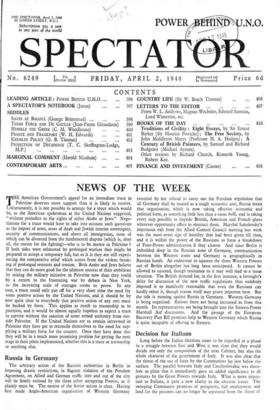Russia in Germany
The arbitrary action of the Russian authorities in Berlin in imposing drastic restrictions, in flagrant violation of the Potsdam Agreement, on Allied and German traffic into and out of the city will be firmly resisted by the three other occupying Powers, as it plainly must be. The motive of the Soviet action is clear. Having first made Anglo-American organisation of Western Germany
essential by her refusal to carry out the Potsdam stipulation that all Germany shall be treated as a single economic unit, Russia treats that organisation, which is now taking effective economic and political form, as something little less than a cases belli, and is taking every step possible to impede British, American and French plans wherever opportunity offers to obstruct them. Marshal Sokolovsky's impetuous exit from the Allied Control Council meeting last week was the most overt sign of hostility that had been given till then, and it is within the power of the Russians to force a breakdown of Four-Power administration if they choose. And since Berlin is imbedded deep in the Russian zone of Germany, communication between the Western zones and Germany is geographically in Russian hands. An endeavour to squeeze the three Western Powers out of Berlin altogether has long been anticipated. It cannot be allowed to succeed, though resistance to it may well lead to a tense situation. The British demand for, in the first instance, a fortnight's delay for discussion of the new traffic regulations thus suddenly imposed is so manifestly reasonable that even the Russians can hardly reject it, though reason itself may prove impotent here. But the tide is running against Russia in Germany. Western Germany is being organised. Rations there are being increased as from this month. Its representatives are being brought into the Sixteen-Power Marshall Aid discussions. And the passage of the European Recovery Plan Bill promises help to Western Germany which Russia is quite incapable of offering to Eastern.






























